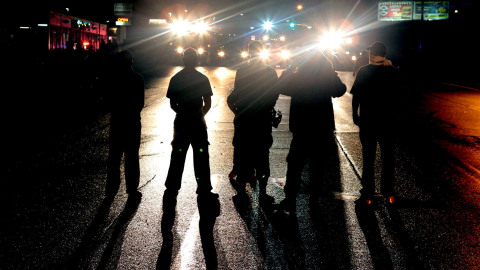 |
| Source: NBC |
The thing about Ferguson is... we are operating squarely within the confines of collective social and institutional memory. Trying to understand police use of force is complicated and difficult. I recommend to everyone that they review both the practices of Ferguson/St Louis County's PD's on their own merits, and the general guidelines on escalation-of-force protocols out there on the internet.
We still have a lot we don't know about the specifics in Michael Brown's death, though we all have our (widely varying) suspicions. We have more information about the Wallace shooting. But we don't know, so much as we feel, that these deaths must be understood in the context of broader trends in law enforcement and the sociological fabric of America. And that is extremely difficult to do, because many police departments and government entities don't appear interested in helping.
I have already spent a lot of Facebook real estate, on my own and others' walls, posting about Ferguson. I've talked with gun owners, police officers, social activists; country folk, city-dwellers; friends and strangers; liberals and conservatives; people of many colors. I've discussed the specifics of the Brown shooting, the relevance and impact of his purported robbery, the history of Ferguson PD, Wilson's background in a now-disbanded department, the feasibility or impossibility of non-lethal force in Wallace's death, the frequency and motivations of suicide-by-cop, and the broader challenges in combating racism in the American justice system -- the same stuff that hopefully all of us have been discussing and writing about.
I will therefore not go into that here. For the curious, suffice to say that, as a moderate social progressive, I think cops have it rough, but the black urban poor have it much rougher, and my empathy for officers runs smack into my belief that authority demands accountability. I also think the truth of the Brown incident probably lies in between the most extreme accounts, though where in between remains uncertain. But in a sense, the resolution of the Brown case shouldn't dominate a conversation about something this big. No one case can fully exemplify a national problem.
Because I think situations like this are always judgment calls in degrees, we can only really get a sense of what is and is not permissible, and desirable, in police behavior at a bird's-eye view. With that in mind, I present the following papers without comment. I did not collect them with a rhetorical goal in mind, and I have not even finished reading them myself. The only thing I'm confident they all had in common was they were written by scholars or analysts, and were subjected to peer review or solicited within the government. I just want to add something tangible to the conversation.
Note: hopefully some of these will be available to those who don't have access to University journal subscriptions. If nothing else, read the abstracts and skim the government-published pdf's. And of course, do your own research. After all, this isn't my area. I'm just trying to do what I can.
Jacobs D, Britt D (1979). Inequality and Police Use of Deadly Force: An Empirical Assessment of a Conflict Hypothesis. Social Problems 26(4).
Kaune MM, Tischler CA (1989). Liability in Police Use of Deadly Force. Am J Police 89.
National Criminal Justice Reference Service, National Institute of Justice: Use of Force by Police, Pt 2.
Garner JH, Maxwell CD. Ch 4, Measuring the Amount of Force Used By and Against the Police in Six Jurisdictions.
Alpert GP, Dunham RG. Ch 5, The Force Factor: Measuring and Assessing Police Use of Force and Suspect Resistance.
Adams K. Ch 6, A Research Agenda on Police Use of Force.
Jacobs D, O’brien RM (1998). The Determinants of Deadly Force: A Structural Analysis of Police Violence. Am J Sociology 103(4).
Fyfe JJ (2006). Police use of deadly force: Research and reform. Justice Quarterly 5(2).
Klinger DA, Brunson RK (2009). Police officers’ perceptual distortions during lethal force situations: Informing the reasonableness standard. Criminology & Public Policy 8(1).
Bennett RR (1997). Excessive force: A comparative study of police in the Caribbean. Justice Quarterly 14(4).
Walker S (2007). Police Accountability: Current Issues and Research Needs. Presented at NIJ Policing Res Workshop, Washington DC (2006).
No comments:
Post a Comment